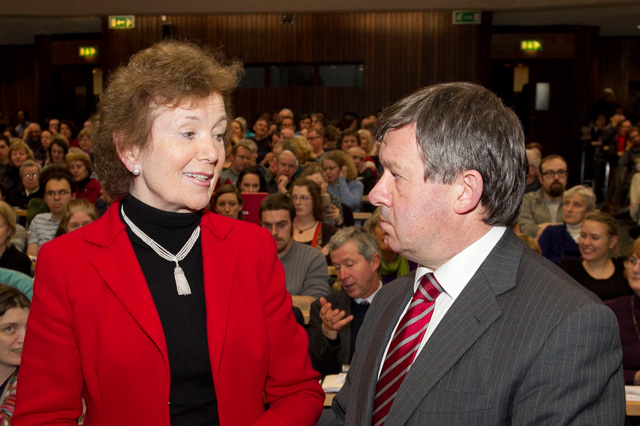Mary Robinson delivered a lecture at University College Cork’s Centre for Global Development on Wednesday 18 January 2012 entitled ‘Climate Justice Post Durban’ [15 pages, 290kb].
Mrs Robinson explored the outcomes of COP17 from a climate justice perspective and the extent to which it addressed the needs of those most vulnerable to the impacts of climate change.
COP17, she said was concerned with “what I believe to be the most critical issue we all face – the future of our planet. In these times of economic crisis, amid worries about our own and the European and international economies, it is not surprising that attention focuses on our immediate problems. But, make no mistake about it, we ignore the threat posed by climate change at our peril.”
Mrs Robinson explained the three priorities for the Foundation at COP17; the legal form of a future climate agreement; food security and agriculture and women’s leadership and the gender dimensions of climate change.
Speaking about the outcome of COP17, known as the Durban Platform for Enhanced Action, Mrs Robinson said: “The door is open for a new international and inclusive legally binding agreement to solve the climate change problem. We have a start date, January 2012, a deadline December 2015, and a lot of work to do, barriers to breakdown and agreement to reach before then.
“Central to this will be overcoming the divide between developed and developing countries in the climate negotiations. The alliance formed between the EU, the Least Developed Countries and the Small Island Developing States at COP17 started to challenge this divide. It is a move in the right direction that will need to be nurtured and strengthened in the coming years to facilitate an ambitious new agreement.”
She said: “We made progress on issues of importance to climate justice including gender equality and food security. Both of these reflect the Principles of Climate Justice which underpin the work of the Foundation and help to communicate the human impacts of climate change and demonstrate the need for solutions which are informed by human rights.”
“This work is far from complete and we will continue to work on these themes inside and outside the Climate Change Convention as core elements of our work on climate justice.”
Related:
University College Cork – Spotlight on Mary Robinson Lecture
Climate issues crucial, says Robinson – The Irish Times, 19 January 2012



